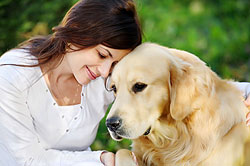Is it Okay to Grieve for Your Pet?
 If it's just an animal, why do I feel so bad?
The question ran through my thoughts, over and over, as I drove back
from taking Juliet, my golden retriever of over a decade, to her very
last visit to the vet. I couldn't stay for the needle. I tossed her
into the arms of the receptionist and ran. If it's just an animal, why do I feel so bad?
The question ran through my thoughts, over and over, as I drove back
from taking Juliet, my golden retriever of over a decade, to her very
last visit to the vet. I couldn't stay for the needle. I tossed her
into the arms of the receptionist and ran.
I took a day off of work. Seriously. To
a non-pet owner this makes no sense. It's just a dog. It's not like
my grandmother died. But I
felt like my grandmother died.
In fact, to be completely honest (sorry grandma), I felt worse then I
did when my grandmother died.
One minute I expected Juliet to pop up
around the corner, the next I was guilty for not squeezing in one last
walk when I had the chance. Did I really need to board her last
Christmas? She must have felt so alone.
Common sense told me I was being silly,
but my insides were telling me something completely different. That
is, until I came home to my husband, and he made a simple comment, that
at first, I completely disagreed with:
It's OK to be mad, he told me.
What did he mean, mad? I wasn't mad. Was I? I mean, I had sworn never to go back to that vet again, but I didn't really blame them. Or, I guess, on second thought, maybe I did.
Only slowly, did I begin to understand
that many emotions comprise the grieving process. Sometimes you feel
them in stages, and sometimes you feel all or part of them all at once
much like being pelted simultaneously by rotten apples, oranges, and
bananas. They all feel bad, but you're not really sure which source
you should address first.
After the loss of your pet, you may feel
empty inside, you may feel depressed and withdrawn you may even be
angry. No matter how you feel, it's important to understand that it's
perfectly normal to go through stages of grief, just as you would after
losing a human loved one.
The Five Stages of Grief
- Denial. During the
denial stage, you may ignore your feelings of sadness or even deny the
fact that your pet is gone. You may feel nothing at all. These
feelings of denial can sometimes happen before the loss of a pet: For
example, if your pet has been diagnosed with a terminal illness, you
may deny that there is something wrong.
- Bargaining. Once the
numbness has subsided, you may find yourself making mental deals with
yourself. It's not uncommon to think things like,
If my dog gets better, I'll never forget to take him for those long walks he likes no matter now busy I am.
- Anger. The loss of
your pet can lead to feelings of anger. You may find yourself feeling
hostility towards your pet's veterinarian for not being able to save or
cure your pet; you may even be angry at yourself, especially if you've
had to make the difficult decision to euthanize your pet.
- Grief. After anger,
true sadness sets in. Grieving is different for everybody, and
everybody works through it at their own pace. Just remember that it's
okay to cry and feel sad don't be afraid to talk to a supportive
friend or family member who understands how much your pet meant to you.
- Acceptance. Acceptance
doesn't mean that you've stopped loving or thinking about your
deceased pet, but it does mean that the pain slowly starts to go away.
When you accept the loss of your pet, you are able to remember the
many happy times you had together. Over time, you may even decide to
welcome a new animal friend into your life.
Finding Closure
There's no right or wrong way to grieve
after the loss of your pet. You may choose to hold a small memorial
service for your pet, or you may decide to make a charitable donation
to a local animal shelter in your pet's name. Sometimes just talking
about it can help: Talk about your loss with a caring friend, or join
an
online support group to connect with others who have recently lost a pet.
Six months after I said goodbye to Juliet,
I got a new dog. Getting a new pet can help you move on as well, as
long as you understand that your new pet will never replace your old
one. Your new pet is a different soul under your care, and it wouldn't
be fair for you or for them to try to mold them in your last pet's
image.
Today, over two years after Juliet's
death, when I watch one of those sappy dog movies, I still sometimes
have to pretend my allergies are acting up so I can get a Kleenex. And
I doubt I'll ever be able to look at Juliet's old pictures without
smiling a sad little smile.
But as time goes by, the pain has gone
away. And gradually, it will for you, too. Then one day, you'll be
joking with friends at dinner and you'll realize that you just told a
story about that camping trip you two went on, or that time she tore up
your grandmothers futon, or the time when she chased after the Great Dane ten times her size, and you'll realize that everyone laughed.
Including you.
|